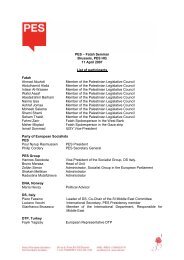Hedge funds and Private Equity - PES
Hedge funds and Private Equity - PES
Hedge funds and Private Equity - PES
You also want an ePaper? Increase the reach of your titles
YUMPU automatically turns print PDFs into web optimized ePapers that Google loves.
Furthermore, since their strategies cannot be deciphered because of their opacity, they must<br />
keep those stabilising processes rolling on through their own market power, not through market<br />
discipline. This is where the argument goes astray.<br />
To insist that HFs <strong>and</strong> PEs enhance efficiency by themselves is a strange argument. If they can<br />
drive the market on their own, it is through sheer market power. Whenever a particular group has<br />
market power, it has the incentive to exploit the market in order to draw a quasi-rent at the<br />
expense of other market participants. How can it be beneficial for market efficiency <strong>and</strong>, further,<br />
for the whole economy? Market dominance should in theory be eliminated by competition<br />
between hedge <strong>funds</strong> <strong>and</strong> the outcome should always be equilibrium, just as it should if market<br />
transparency disseminated information to all market participants. (If the alternative investment<br />
industry is still of the same opinion, why are they against transparency <strong>and</strong> disclosure?)<br />
The lesson of LTCM, for instance, is that it entailed the Fed’s extraordinary lender-of-the-lastresort<br />
intervention to forestall the impending flight to quality. Observing that the same outcome<br />
was not needed in May 2005, in the turmoil provoked by the slump in GM <strong>and</strong> Ford derivative<br />
contracts after the downgrade in their rating, is no assurance that hedge <strong>funds</strong> have gotten more<br />
robust or “society responsible”. The difference between 2005 <strong>and</strong> September 1998 was the<br />
situation of global financial markets. In 1998 they were under extreme stress in the aftermath of<br />
the Russian crisis. In 2005 they were awash with cash after many years of loose monetary policy.<br />
While the investment industry keeps on repeating that maximum value should be returned to<br />
shareholders, because shareholder decisions are inevitably beneficial to society as a whole; <strong>and</strong><br />
that taking companies private shields managers from the short-term pressures of financial<br />
markets – all the evidence contained in this report suggests the contrary.<br />
The question of appropriate regulation basically depends on what kind of investment strategy is<br />
desired in Europe – <strong>and</strong> that is directly defined in our Lisbon goals <strong>and</strong> New Social Europe for<br />
the development of our societies in the next decade.<br />
Some HFs <strong>and</strong> PEs would argue that regulations would “force them” to seek out other locations<br />
outside Europe. We think there are three answers to this attitude:<br />
Europe’s single market is the world’s largest economy (10% bigger than that of the US). This<br />
market is enormously attractive for foreign investors – <strong>and</strong> with the high growth rates of the<br />
new member states, its importance will increase in the coming years.<br />
“Creativity” <strong>and</strong> “financial engineering” to avoid the effect of regulators will always be a fact<br />
of life. As we have learned from national experience, regulation is an ongoing, permanent<br />
process during a changing environment.<br />
We are aiming for appropriate <strong>and</strong> carefully targeted regulations, not disproportionate, general<br />
prohibitions or over-detailed regulations.<br />
The aim of regulation in this sector of the financial market should be to exclude certain characteristic<br />
risks <strong>and</strong> to compare results with preordained aims or have the ability to influence the<br />
development in the interest of society. No company should have substantially worse results due<br />
to LBO in its results, than before. No company that is the object of LBO should lose assets or<br />
sacrifice labour st<strong>and</strong>ards because its financial assets are plundered due to unwarranted<br />
charges <strong>and</strong> fees or predominantly debt-based financing.<br />
Better investor protection, proper corporate governance, long-term investment <strong>and</strong> prospects<br />
of safe <strong>and</strong> decent jobs should be our road map for reforming the real economy as well as regulating<br />
the financial markets.<br />
Part III – Lessons to be drawn for future regulation<br />
155




